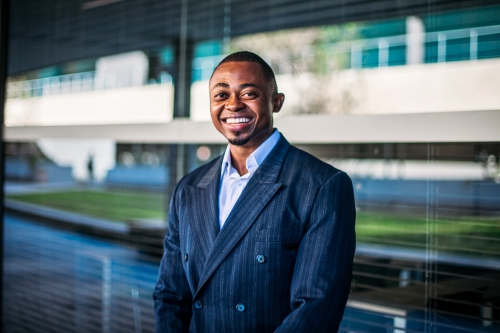Goal setting got him his PhD in record time

Malibongwe Manono is an extraordinary young man. He grew up in Khayelitsha with his family and went to school there except for a short stint from Grade 3 to Grade 9 when he attended school in Willowvale in the Eastern Cape. He returned to Cape Town in 2003 and joined the Joe Slovo Engineering High School for Grade 10 to Grade 12.

The school only offered maths and physical science on standard grade and in the last term of Grade 11, Malibongwe started teaching himself higher grade maths and physical science. It was thanks to his Physics teacher, Mr Mananga, who introduced Malibongwe to SAILI who offered Saturday classes and by the end of Grade 11, he was the top maths and physics student. In Grade 12 he was the top SAILI achiever in Physics and 2nd in Mathematics, and for his final matric results, he got 93% for Higher Grade Physics and 87% for Higher Grade Maths with most of the work been self-taught.
In 2006, he started his BScEng in Chemical Engineering at UCT in the ASPECT programme as he came from a disadvantaged school. He received a Yvonne Parfitt bursary which covered his tuition fees and Financial Aid for his accommodation and living costs. During his first semester, he approached the head of department, Professor Eric Van Steen to ask him if he could please go into the mainstream programme, and at the end of his first year, he was on the Dean’s merit list.
In his second year, he got a Chevron bursary and thought that his career would be in petrochemicals. However, for his fourth-year project, his thesis partner was from Lesotho and persuaded Malibongwe to do their project in mineral processing. He completed his undergraduate degree in May 2010, and due to the economic downturn in the global economy, he was released from his Chevron bursary job obligation which left him without a job to go to. A/Professor Kirsten Corin from the Centre for Minerals Research offered him a part-time job in a lab, and in August 2010, he registered for his master’s degree and graduated in June 2012.
At the beginning of 2011, six months into his master’s, during his thesis review, he was advised to upgrade his master’s degree to a PhD. He felt he was very young and decided he needed to go out into industry and earn some money and gain some experience. He started working in September 2011 as a candidate engineer for ArcelorMittal in Saldanha Bay, and two years later he was formally appointed as an engineer and moved to the Vanderbijlpark plant.
During this time, the PhD idea was still in the back of his mind, and he applied for a teaching job in the Department of Metallurgical Engineering at VUT. During his interview, he asked about doing a PhD, and his HOD was very supportive and encouraged him to enrol for his PhD. In June 2015, he emailed A/Professor Kirsten Corin about his idea for his PhD, and she had just been granted some funding for research in the area of water recycling in mining. The topic of his PhD is ‘Investigating Electrolyte-Reagent-Mineral Interactions in Response to Water Quality Challenges in the Flotation of a Platinum Group Minerals ore.’
He enrolled in June 2015 and thanks to the very supportive environment at VUT, and working together with a group of young staff members who were also registered for their PhDs; he managed to complete most of the ground work, before he joined UCT in July 2016 on a three-year MQA contract teaching position.
He knew it was a risk that he was taking, giving up a full-time position for a contract position. He also had just lost his father and his grandmother, so it was a difficult time, but he returned to Cape Town, and has completed his part-time PhD in three and a half years, a tremendous achievement.
When people ask him how he has achieved this, he says, “It is about setting a goal. I had a three-year contract, so I made sure that in those three years, I would complete my PhD, and this is what I have done.” He added, “The block teaching in the Department of Chemical Engineering gives you the freedom to work hard on your research goals for the year.”
Malibongwe’s three-year contract comes to an end at the end of June 2019, and as from 1 July 2019 he will be a permanent senior lecturer in the Department of Chemical Engineering..